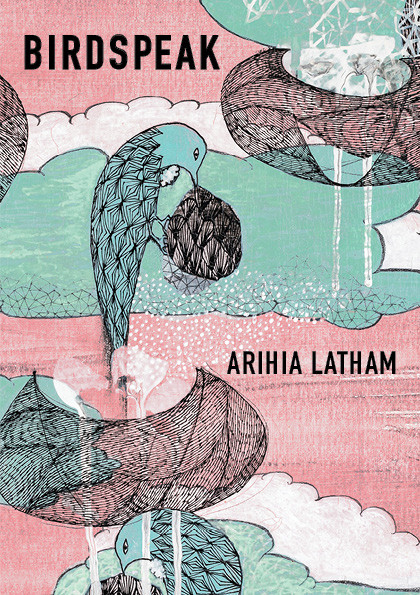Arihia Latham’s debut collection embodies a tangata whenua consciousness and is divided into three symbolic movements that expand its human-animal title. Birdspeak evokes what philosopher Carl Te Hira Mika describes as a ‘worlded perception,’ where language presents visible and invisible realities embedded in Māori poetics. A reader may encounter a hiddenness intrinsic to each poem, what Mika posits as ‘a gathering of entities’ beyond customary semantics and textual analysis. This collection includes visceral portraits, reimagined pūrākau, and a pātaka of emotional memory. The poet circumnavigates the atua zone and transcultural dissonance with craft, often drawing from a volatile biography.
Aotearoan and American political struggles converge in ‘I can’t breathe (Tohunga Suppression Act 1907)’. The title juxtaposes New Zealand’s historical law against traditional healing practices – and the resultant calamity for Māori mortality – with the rhetoric of the Black Lives Matter movement. The now sloganised ‘I can’t breathe’ originates from the dying words of Eric Garner, an African American man killed in 2014 by a policeman’s chokehold. The speaker recalls:
Tahi rua toru whā
five generations
before today
Something was held under
until it was limp.An act of suppression
lawful suffocation
A hand
on a mouth
incantating
At the end of the poem, Latham’s other work as a rongoā practitioner infuses her ethics:
The mana held
in the circling rings
of thousand-year-old trees
carved into the arcs of
these healing hands.
The longer poem ‘Pūngawerewere suspends my skeleton in the stars’ conjures another body in crisis – female, lactating. Skeletal structures are etched with precision (‘Trabecular bone is spongy’) and lyricism (‘these bones formed in the sea of our mothers / hardening to the sounds of disappearing dreams’). At the end of each of the first five stanzas, the line ‘I am nothing without you’ is repeated, a psychological self-taunt more than admission. Latham’s webbed metaphors both reveal and conceal the criminality of an ordinary abuser – a lover and father:
The car window shattered like a spider’s web
suspended in the sunlight
the glass falling in my lap around our baby
breastfeeding
that was what I got
crystal fireworks
were mine
Encounters with contemporary visual arts inspire two ekphrastic poems, ‘Tai moana’ and ‘Manu tiria: digging bird’, responding to works by sculptor Brett Graham and photographer Tia Ranginui respectively. Pages of visual poetics and imaginative attention to line yield texture, complicating the more confessional strains throughout. ‘Whakapurenga’ imprints like sacred geometry surrounded by white space. A purification rite is performed, followed by a diamond of stars, tukutuku patterns or kisses:
Before
Name
Cleanse
Release
Observe
Hope
Offer
Wade
Afterx
x x x
x x x x x
x x x
x
Dark skies and Māori worldedness entangle in ‘Nine stars, one night’, referencing the celebrated star cluster Matariki. There are intertextual flirtations: think Taika Waititi’s short film Two Cars, One Night and the transience of its characters portrayed in black and white. Here ‘our worlds are muddled, peter out’ and ‘we turn our backs on the sky.’ A sole stanza erodes, line by line, mimicking Nature’s decline, beginning where ‘the pīngao hugs the dunes, a gold scouring pad working / the night-matched iron sand into a shine’ and in a cave where ‘centuries of stories are / whispered back in stone’s indifferent way’.
Concern for and kinship with local ecologies amplifies Birdspeak, including the striking cover art by Natalie Couch. In affinity with the numerous manu kaitiaki of the collection, ‘The crash of living things’ bemoans a legacy of deforestation:
There are logs piled like
sponge rolls at a bake sale
Strangely foreign
they do not remind me of a forest
More like severed fingers
of thieves
The ruination caused by a ‘chorus’ of chainsaws is likened to social workers removing children from their homes – wryly throwing shade on controversial government agency Oranga Tamariki. There’s an echo of William Pember Reeves’s ‘The Passing of the Forest – A Lament for the Children of Tāne’, written in 1898, though Latham, as a descendant of Tāne, adds fresh lines to an old dirge, continuing a tradition of eco-poetry in New Zealand since the nineteenth century.
The crash of living things
becoming logs
of familiesBecoming statistics
Where is the rātā bound to the rimu?
Tina Makereti’s ‘Spiral Whakapapa of Māori Literature’ illustrates a writerly practice oscillating between creation narratives, visual traditions, oral traditions, contemporary art forms, and English texts. Attentive to this literary genealogy, Birdspeak channels ancestral forces such as Ranginui, Papatūānuku, Tawhirimātea, Hiwa-i-te-Rangi, and extends a hongi to Hinenuitepō. In ‘Hineahuone’, the atua croons in deep-spiral time:
My legs are swamp maire
sodden weights
hip sockets wide like
the pae maunga
on either side of the lake
that holds all of our DNA
swirling in small spirals
like mayfly larvae
J.C. Sturm, renowned for crafting emotional landscapes from familial biography, seems to haunt certain poems (‘Love Letter,’ ‘Waitangi’) as does, more explicitly, Hone Tuwhare (‘Rain’). An ode to Latham’s mother left comatose after a car accident as a young woman is poignant with grief and sibilance: ‘The tikanga of missing a tangi / due to unconsciousness.’ Whānau and the domestic sphere are vital to Birdspeak. In ‘Domestic disturbance’, repeated ignorance toward protocols of tapu and noa unsettles a home:
You fold my washing on my kitchen table
and I should be grateful
but I pick up the basket
and just say maybe you’ll be more comfortable in the
lounge
The book is undoubtedly a ‘gathering of entities’ haloed by a constellation of tīpuna, mentors, colleagues, whanauka, and friends whose support is acknowledged by the author. Endorsements for this first collection feel earned. An ecologically minded song of survival, Birdspeak should find an eager readership across generations.



